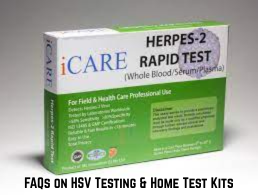Table of Contents
Herpes Simplex Virus (HSV) infections are common, and the ability to quickly and accurately diagnose the infection is crucial for effective management and prevention. With advancements in diagnostic tools, including herpes test kits and HSV testing at home, individuals can now perform tests conveniently. This article explores some of the most frequently asked questions about herpes simplex virus (HSV) tests, covering topics such as testing methods, accuracy, home testing kits, and more.
What is a Herpes Simplex Virus (HSV) Test?
A Herpes Simplex Virus test is used to diagnose infections caused by the herpes simplex virus, which typically results in oral or genital herpes. The test detects antibodies or the virus itself in the body, indicating whether the person is infected with HSV.
- How does it work? The HSV test works by either detecting viral DNA through PCR testing or identifying antibodies against the virus in the blood, indicating previous or current infection.
Which Herpes Simplex Virus Types are Tested?
The HSV test commonly screens for two types of herpes simplex viruses:
- HSV-1: Primarily responsible for oral herpes (cold sores).
- HSV-2: Primarily responsible for genital herpes.
Testing may differentiate between these two types to help understand the location and severity of the infection.
How Accurate is a Herpes Test in Detecting HSV Infections?
The accuracy of an HSV test depends on several factors, including the type of test used (blood test vs. swab test) and the timing of the test.
- PCR tests for detecting the virus are highly accurate and considered the gold standard for diagnosing active infections.
- Blood tests that detect antibodies may sometimes yield false-negative results if taken too early after exposure, as the body might not have produced enough antibodies yet.
Confirmatory testing may be necessary in some cases, especially if symptoms persist or are unclear.
What Are the Benefits of Using a Herpes Test Kit?
Herpes test kits, such as the HSV-2 IgG home user rapid test kit, offer several advantages:
- Convenience: You can test at home without the need to visit a clinic.
- Privacy: These kits provide a confidential and discreet method of testing.
- Quick results: Many kits provide results in just 15-20 minutes, allowing for quick decision-making.
What is the Difference Between a Herpes Test Kit and a Lab Test?
- Herpes Test Kit: Home test kits typically involve a quick, simple process where a sample (e.g., blood, swab) is collected and the test results are available within minutes.
- Lab Test: A laboratory test, such as a blood test for HSV, is usually more accurate and can distinguish between HSV-1 and HSV-2 infections. Lab tests are also more reliable for detecting recent infections.
What Sample Types Are Used for Herpes Testing?
- Blood: The HSV blood test detects antibodies against the herpes simplex virus. It is typically used for diagnosing past infections.
- Swab Samples: A sample is taken from a lesion or sore to directly test for the presence of the virus (used in PCR or viral culture tests).
- Urine or Saliva: Less commonly used, but may be utilized for specific types of testing.
How Quickly Can Results Be Obtained from a Herpes Test?
- Instant Herpes Tests: Home test kits like the HSV-2 IgG home user rapid test kit provide results within 15-20 minutes.
- Lab-Based Tests: Laboratory testing for HSV typically takes 1-3 days depending on the method used (e.g., PCR, blood tests, viral culture).
What Are the Common Applications of Herpes Testing in Healthcare?

Herpes testing is commonly performed for:
- Diagnosing Symptoms: Testing is done to confirm if symptoms like sores or blisters are caused by herpes.
- Prenatal Testing: Pregnant women are tested for HSV-2 to avoid the risk of transmitting the virus to the baby during childbirth.
- Partner Testing: It can help individuals determine if they are infected, allowing them to make informed decisions regarding sexual health.
Is the Herpes Test Legally Recognized?
Yes, herpes tests are legally recognized and commonly used worldwide for diagnosing HSV infections. These tests are used in clinical settings, including healthcare facilities, public health screenings, and private medical practices. In most countries, tests like the herpes simplex virus test kit are approved by regulatory bodies, such as the FDA (in the U.S.) and other health authorities in Europe, Australia, and Asia.
Can Herpes Test Kits Be Used at Home?
Yes, home herpes test kits are available for both HSV-1 and HSV-2 infections. These kits allow users to test themselves in the comfort of their homes. The most common test involves taking a small blood sample, often via a finger prick, and obtaining rapid results.
- Advantages of Home Testing: These kits are discreet, easy to use, and provide quick results without needing to visit a clinic or laboratory.
- Accuracy of Home Tests: While these kits are convenient, they may not be as accurate as professional lab-based tests. A positive result may need to be confirmed with a more precise test.
Can Prescription Medications Affect Herpes Test Results?
In most cases, prescription medications for herpes (such as antivirals) should not affect the results of the HSV test. However, it’s important to inform your healthcare provider about any medication you are taking, as certain drugs can potentially affect the accuracy or interpretation of test results.
How Should One Prepare for a Herpes Test?
Generally, there is no special preparation required for most herpes tests. However, it’s important to:
- Avoid applying creams or medications to the affected area before a swab test.
- Inform your healthcare provider of any medications or treatments you are currently using.
- Ensure an active outbreak for swab-based tests, as the virus is more easily detected during an outbreak.
How Often Should Herpes Testing Be Done?
Herpes testing frequency depends on risk factors:
- Individuals with frequent outbreaks: Those who experience recurring symptoms should consider getting tested regularly to monitor the virus and adjust treatment as needed.
- High-risk individuals: People with multiple sexual partners or those with a partner diagnosed with HSV should consider periodic testing.
Are Herpes Tests Used for Law Enforcement?
While herpes tests are not typically used for law enforcement purposes, they may be requested in specific circumstances involving sexual health investigations or cases of assault.
- Law Enforcement and HSV Testing: Law enforcement generally does not use herpes tests, but they could be used in legal cases involving sexually transmitted infections (STIs).
Can Herpes Testing Differentiate Between HSV-1 and HSV-2?
Yes, some herpes test kits can differentiate between HSV-1 and HSV-2, especially blood tests that look for specific antibodies. Knowing the difference is important for treatment and understanding the risks of transmission.

How Reliable Are At-Home Herpes Test Kits?
At-home herpes test kits are generally reliable for detecting herpes antibodies. It’s crucial to follow the instructions carefully and confirm any positive result with a healthcare provider for more accurate diagnosis and management.
What Should Be Done if a Herpes Test Result is Positive?
If the herpes test result is positive:
- Seek confirmation: If the result is from a home test, confirm it with a healthcare professional who can provide a more accurate test.
- Consult with a doctor: A healthcare provider will discuss treatment options and help manage outbreaks, often recommending antiviral medication to reduce symptoms and prevent transmission.
- Inform partners: It is important to inform sexual partners about the diagnosis and discuss precautions to avoid transmission.
Conclusion
Herpes testing is an important part of managing HSV infections, both for individuals experiencing symptoms and those who may not be aware they are infected. Whether through home test kits or professional lab tests, knowing your status allows for better management and prevention of outbreaks. If you suspect you have herpes, it’s important to get tested and seek appropriate medical guidance.







